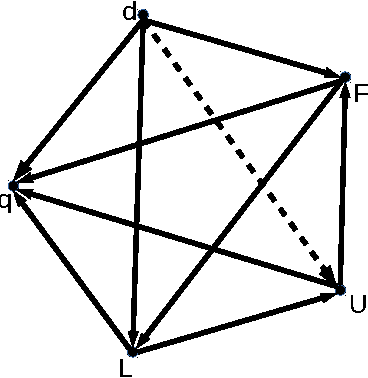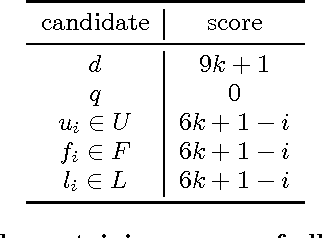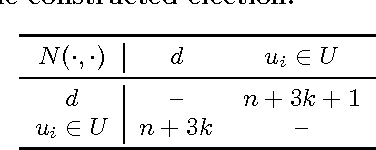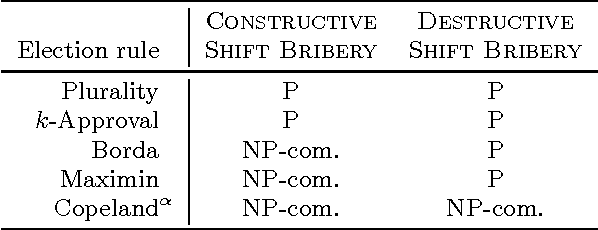Andrzej Kaczmarczyk
Efficient Algorithms for Electing Successive Committees
May 23, 2025Abstract:In a recently introduced model of successive committee elections (Bredereck et al., AAAI-20) for a given set of ordinal or approval preferences one aims to find a sequence of a given length of "best" same-size committees such that each candidate is a member of a limited number of consecutive committees. However, the practical usability of this model remains limited, as the described task turns out to be NP-hard for most selection criteria already for seeking committees of size three. Non-trivial or somewhat efficient algorithms for these cases are lacking too. Motivated by a desire to unlock the full potential of the described temporal model of committee elections, we devise (parameterized) algorithms that effectively solve the mentioned hard cases in realistic scenarios of a moderate number of candidates or of a limited time horizon.
On Sequential Fault-Intolerant Process Planning
Feb 07, 2025Abstract:We propose and study a planning problem we call Sequential Fault-Intolerant Process Planning (SFIPP). SFIPP captures a reward structure common in many sequential multi-stage decision problems where the planning is deemed successful only if all stages succeed. Such reward structures are different from classic additive reward structures and arise in important applications such as drug/material discovery, security, and quality-critical product design. We design provably tight online algorithms for settings in which we need to pick between different actions with unknown success chances at each stage. We do so both for the foundational case in which the behavior of actions is deterministic, and the case of probabilistic action outcomes, where we effectively balance exploration for learning and exploitation for planning through the usage of multi-armed bandit algorithms. In our empirical evaluations, we demonstrate that the specialized algorithms we develop, which leverage additional information about the structure of the SFIPP instance, outperform our more general algorithm.
Selecting the Most Conflicting Pair of Candidates
May 09, 2024Abstract:We study committee elections from a perspective of finding the most conflicting candidates, that is, candidates that imply the largest amount of conflict, as per voter preferences. By proposing basic axioms to capture this objective, we show that none of the prominent multiwinner voting rules meet them. Consequently, we design committee voting rules compliant with our desiderata, introducing conflictual voting rules. A subsequent deepened analysis sheds more light on how they operate. Our investigation identifies various aspects of conflict, for which we come up with relevant axioms and quantitative measures, which may be of independent interest. We support our theoretical study with experiments on both real-life and synthetic data.
Algorithms for Destructive Shift Bribery
Oct 03, 2018



Abstract:We study the complexity of Destructive Shift Bribery. In this problem, we are given an election with a set of candidates and a set of voters (each ranking the candidates from the best to the worst), a despised candidate $d$, a budget $B$, and prices for shifting $d$ back in the voters' rankings. The goal is to ensure that $d$ is not a winner of the election. We show that this problem is polynomial-time solvable for scoring protocols (encoded in unary), the Bucklin and Simplified Bucklin rules, and the Maximin rule, but is NP-hard for the Copeland rule. This stands in contrast to the results for the constructive setting (known from the literature), for which the problem is polynomial-time solvable for $k$-Approval family of rules, but is NP-hard for the Borda, Copeland, and Maximin rules. We complement the analysis of the Copeland rule showing W-hardness for the parameterization by the budget value, and by the number of affected voters. We prove that the problem is W-hard when parameterized by the number of voters even for unit prices. From the positive perspective we provide an efficient algorithm for solving the problem parameterized by the combined parameter the number of candidates and the maximum bribery price (alternatively the number of different bribery prices).
 Add to Chrome
Add to Chrome Add to Firefox
Add to Firefox Add to Edge
Add to Edge